Australia rates top for nuclear safety. Australia ranks number one out of all countries with weapons-usable nuclear materials according to a report today by the international organisation the Nuclear Threat Initiative (NTI).
The NTI Index examines nuclear materials security conditions in 32 countries with one kilogram or more of weapons-usable nuclear materials, as well as in 144 additional states that have less than one kilogram of this material, or none, but could be used as safe havens, staging grounds or transit points for illicit nuclear activities.
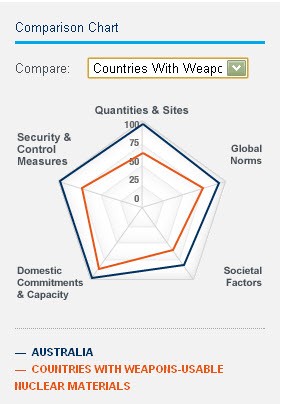
The report, NTI Nuclear Materials Security Index: Building a Framework for Assurance, Accountability and Action, was developed with the Economist Intelligence Unit. It was released ahead of the March 2012 Nuclear Security Summit to be held in Seoul. was released ahead of the March 2012 Nuclear Security Summit in Seoul.
The five key factors the Index evaluated are:
- Quantities and Sites. How much material does the state have and at how many locations?
- Security and Control Measures. What kind of requirements for protection measures are in place?
- Global Norms. What international commitments related to materials security has the state made?
- Domestic Commitments and Capacity. What is the domestic capacity of the state to fulfill those international commitments?
- Societal Factors. Could a given country’s societal factors — such as corruption or government instability — undermine its security commitments and practices?
Australia ranked first among states with weapons-usable nuclear materials “because it has reduced holdings to a small amount of materials and does well across all other categories.”
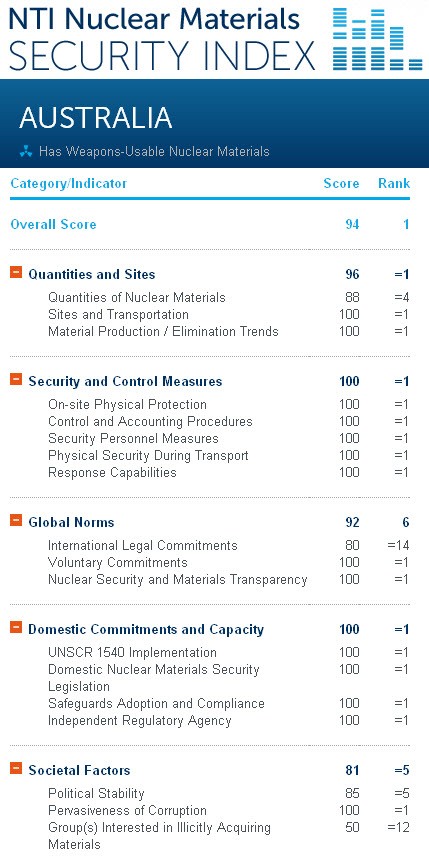
Findings developed through the process of creating the NTI Index include the following:
- Governments are becoming more aware of the threat posed by vulnerable weapons-usable nuclear materials and the urgent need to strengthen security.
- There is no global consensus about what steps matter most to achieve security and no agreed international system or globally accepted practices for regulating the production of, use of, and security requirements for weapons-usable nuclear materials.
- A deliberate lack of transparency makes it impossible to hold states accountable for their security responsibilities. Many details around site security are — and should be — protected. But other information, such as general approaches to providing security and broad descriptions of security regulations for nuclear facilities and materials holdings, could be made public.
- The United Kingdom is the leader among nuclear-armed states, with high scores on Security and Control Measures as well as on its commitment to and follow-through on international obligations. Like most nuclear-armed states, its score is lowered because of its large inventory of weapons-usable materials held at numerous sites, both for military and civilian programs. All nuclear-armed states can and must do more.
- Nearly a quarter of the states with weapons-usable nuclear materials scored poorly on Societal Factors because of very high levels of corruption. Of those countries, several also scored poorly on the prospect of political instability over the next two years. The combination of those factors significantly increases the risk that nuclear materials might be stolen, with help from corrupt insiders or in the midst of government distraction or political chaos.
- Stocks of weapons-usable materials continue to increase in a few countries, making global security a difficult and moving target.
- More states with weapons-usable materials could join the 19 countries, plus Taiwan, that already have completely eliminated their weapons-usable nuclear materials. A number of countries have only small amounts of materials at one or two sites, which might be converted to non-weapons-usable fuels or shut down.
- Many states lag on joining international agreements aimed at tighter security; many that do join fail to implement their commitments.
Pakistan’s political chaos. If government distraction or political chaos are potential conditions for nuclear materials being stolen then we had best start hoping for the best in Pakistan.
The BBC News this morning speaks of Pakistan’s political scene looking “like the OK Corral”, with the main organs of state and other players heading for an inglorious showdown.
In the past few weeks, it reported, the powerful military has heaped pressure on the civilian government by participating in a Supreme Court inquiry which could see President Zardari condemned as a “traitor”.
The Times of India summarised conditions this way:

That should be enough to make us worry about this ranking of Pakistan down near the bottom of that NTI index!
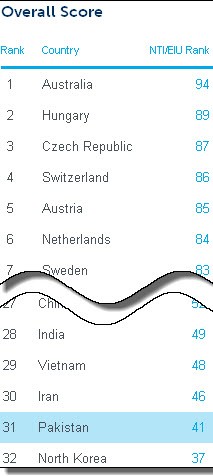
Bit today but maybe a Papal blessing tomorrow. The Northern Territory News was back on familiar territory this morning.
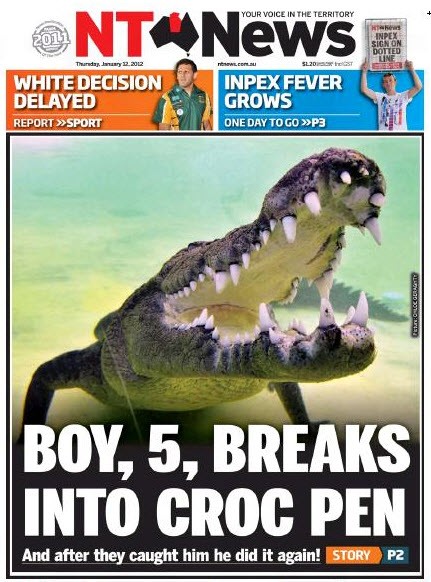
Perhaps tomorrow they will follow up with this:
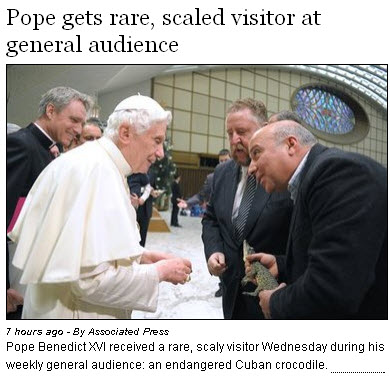
The rare Cuban crocodile will be returned home by His Holiness when he visits Cuba in March after the Crocodylus rhombifer was seized by Italian forestry authorities late last year after it was discovered in an Italian private collection.







Maybe he was chasing the boy?
How coincidental that the NTI should rank Australia as No.1 for nuclear safety when less than two months ago, Barack Obama arrived in Australia, promising deeper U.S. engagement in the Asia-Pacific region and announcing plans to boost the U.S. military presence on the continent where they can play cowboys and Indians.
Who were the founding members of the NTI project? Well there’s one Henry Kissinger who Christopher Hitchens writes was the primary force behind certain acts that could quite plausibly be considered war crimes. Then there’s former Secretary of Defence, William J. Perry. He sounds okay but let’s face it, these gentlemen are complicit in war mongering, aided by the nuclear behemoth for blowing up the enemy (and civilians). So now these ageing old codgers are endeavouring to atone for their sins by seeking a prognosis for a radioactive earth and the nuclear proliferation for which they are largely responsible.
So America’s NTI ranks Australia No.1 for nuclear safety even though it flogs its uranium off to the nearest bidder – i.e., nuclear weapons states – the U.S., U.K., China, France, Russia – where not one of them takes seriously its obligation under the Non-Proliferation Treaty to pursue disarmament in good faith. Oh ye hypocrites! Of course Australia has a reputation as a sucker for countries who want to use down under as a nuclear testing/storage?/waste dump? site. Haven’t they Mr Ferguson?